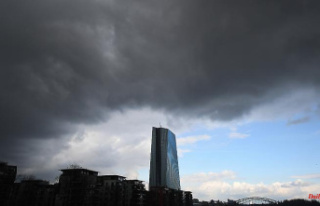The Zaporizhia nuclear power plant has been at the center of hostilities for weeks. Russia and Ukraine accuse each other of shelling the facility. After damage to the lines, the operator now completely disconnects the system from the grid. The security systems continued to work.
According to the operator of the nuclear power plant, the two remaining reactor blocks of the Zaporizhia nuclear power plant were taken off the grid. Enerhoatom reports that the reason for this is fire damage to power lines. This was "the first time in the history of the plant" happened. Work is underway to reconnect the two reactors to the grid. The security system of the nuclear power plant works. According to experts, however, disconnecting from the power grid endangers the absolutely necessary cooling of the reactors. Enerhoatom suspects that Russia wants to connect Zaporizhia to Crimea's power grid.
Fires in ash pits in an adjacent thermal power plant interrupted the last remaining connection line between the nuclear power plant and the Ukrainian power grid, Energoatom said. Three other lines had previously been damaged "by terrorist attacks" by the Russian side. Attempts are currently being made to bring at least one reactor back online. Ukrainian technicians work in Zaporizhia under Russian control.
The power supply to the nuclear power plant itself is still guaranteed via the thermal power plant, the Ukrainian energy company explained. According to experts, a permanent power supply is essential for the safety of nuclear power plants - even when they are switched off, because even then these plants have to be cooled.
The Russian occupiers later announced that one of the two blocks was already online again. They only needed to be shut down temporarily after a fire broke out due to Ukrainian shelling, the region's occupation chief, Yevgeny Balitsky, wrote on Telegram. The information provided by both sides was initially not independently verifiable.
In the meantime, there had been a massive power outage in the parts of southern Ukraine around the nuclear power plant occupied by Russia. "Today the city is completely without electricity and water as a result of enemy shelling," Enerhodar Mayor Dmytro Orlov, who fled to the Ukrainian-controlled part of the country, told Telegram. A good hour later, Orlow informed about the gradual restoration of the power supply in the small town where the nuclear power plant is located.
The Russian occupation authorities in the area, in turn, announced that the city of Melitopol had been supplied with electricity again after an interruption of about an hour and a half. There was a fire and a short circuit on high-voltage lines, it said. No specific information was given about the causes. In the neighboring Kherson region, too, the occupation authorities reported the power failure without giving any reason and announced that the power supply would soon be restored.
For weeks, Russia and Ukraine have been accusing each other of shelling Europe's largest nuclear power plant, which the Russians captured in early March. The information provided by both sides is often not independently verifiable. The plant, located not far from Russia's annexed Crimea peninsula, has a total of 6 of Ukraine's 15 reactors. They can supply four million households with electricity.
The state-owned Ukrainian nuclear power plant operator Enerhoatom has repeatedly accused the Russian occupiers of preparing to connect the areas to the Russian power grid. The shelling of high-voltage lines is a diversionary tactic to first de-energize the occupied areas and then gradually synchronize them with the Russian grid.












